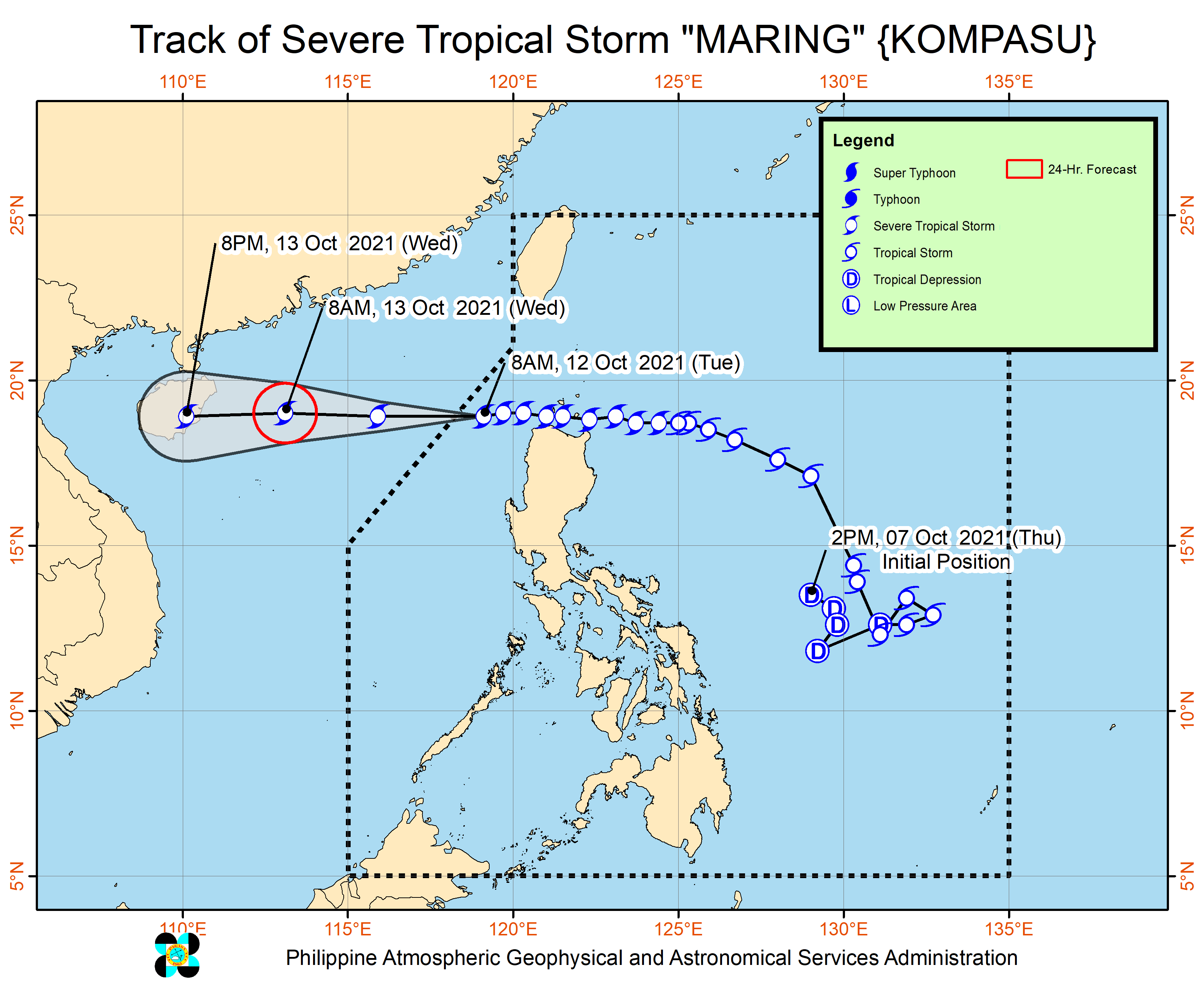SUMMARY
This is AI generated summarization, which may have errors. For context, always refer to the full article.

Severe Tropical Storm Maring (Kompasu) was about to leave the Philippine Area of Responsibility (PAR) late Tuesday morning, October 12, after battering Northern Luzon with torrential rain.
But there will still be rain from Maring and the enhanced southwest monsoon in the coming hours, the weather bureau warned.
The Philippine Atmospheric, Geophysical, and Astronomical Services Administration (PAGASA) said in its 11 am bulletin on Tuesday that Maring was already 315 kilometers west of Calayan, Cagayan.
The severe tropical storm slightly slowed down, moving west at 20 kilometers per hour from the previous 25 km/h.
It continues to have maximum sustained winds of 100 km/h and gustiness of up to 125 km/h. (READ: FAST FACTS: Tropical cyclones, rainfall advisories)
Maring had made landfall in Cagayan’s Fuga Island at 8:10 pm on Monday, October 11. It caused floods and landslides in parts of Cagayan Valley, the Ilocos Region, and the Cordillera Administrative Region (CAR).
Rain from the severe tropical storm will persist in these regions and provinces on Tuesday:
Heavy to intense rain
- Ilocos Region
- Benguet
- Ifugao
- Abra
- Mountain Province
Moderate to heavy rain
- rest of Cordillera Administrative Region
- Zambales
- Bataan
- Tarlac
Light to moderate rain, with at times heavy rain
- rest of Central Luzon
- Metro Manila
- Cagayan Valley
The southwest monsoon or hanging habagat, still being enhanced by Maring, is also affecting western parts of Luzon and the Visayas.
Moderate to heavy rain
- Occidental Mindoro
- Palawan
Light to moderate rain, with at times heavy rain
- rest of Mimaropa
- Metro Manila
- Bataan
- Cavite
- Batangas
- Antique
- Aklan
- Negros Occidental
Tropical cyclone wind signals remain in effect as of 11 am on Tuesday.
Signal No. 2 (damaging gale-force to storm-force winds)
- Batanes
- Cagayan including Babuyan Islands
- northern part of Isabela (Palanan, Divilacan, Maconacon, Ilagan City, Tumauini, Cabagan, San Pablo, Santa Maria, Santo Tomas, Delfin Albano, Quirino, Gamu, Roxas, Mallig, Quezon)
- Apayao
- Kalinga
- Mountain Province
- Abra
- Ilocos Norte
- Ilocos Sur
Signal No. 1 (strong winds)
- rest of Isabela
- Nueva Vizcaya
- Quirino
- Ifugao
- Benguet
- La Union
- Pangasinan
- Aurora
- Nueva Ecija
- Tarlac
- Zambales
- Pampanga
- Bulacan
- northern part of Bataan (Samal, Morong, Dinalupihan, Abucay, Orani, Hermosa)
- northern part of Quezon (General Nakar, Infanta) including Polillo Islands
PAGASA added that gusty conditions are being experienced in other areas on Tuesday due to Maring’s “expansive wind field” and the enhanced southwest monsoon.
- rest of Luzon
- Visayas
- Dinagat Islands
- Surigao del Norte
- Agusan del Norte
- Misamis Oriental
- Misamis Occidental
- Camiguin
- Zamboanga del Norte
The weather bureau also reiterated that there is a “minimal to moderate risk” of life-threatening storm surges up to 1 meter high on Tuesday.
“Rising seawater along with the high waves from the shoreline moving inland may cause flooding in the low-lying coastal localities of Babuyan Islands and Ilocos Norte,” it said.
Coastal waters are still affected by both Maring and the surge of the southwest monsoon.
Rough to high seas (waves 2.8 to 7.5 meters high)
Conditions risky for all vessels
- seaboards of areas under Signal Nos. 1 and 2
Rough to very rough seas (waves 2.8 to 4.5 meters high)
Small vessels advised not to sail, larger vessels alerted against big waves
- western seaboard of Central Luzon (not under a tropical cyclone wind signal)
- seaboards of Southern Luzon and Visayas
- western, eastern, and northern seaboards of Mindanao
Moderate to rough seas (waves 1.2 to 2.5 meters high)
Conditions risky for small vessels
- remaining seaboards of the country
After its expected exit from PAR on Tuesday morning, Maring will move west toward Hainan, China, where it could make landfall on Wednesday evening, October 13.
Maring may gradually strengthen within the next 36 hours, but it is “becoming less likely to reach typhoon category” prior to its possible landfall in Hainan.

Maring is the Philippines’ 13th tropical cyclone for 2021 and the second for October.
On Sunday morning, October 10, Maring had completed its merger with the remnant low that was formerly Tropical Depression Nando. The two tropical cyclones had interacted over the Philippine Sea, resulting in the merger.
Nando, the Philippines’ 14th tropical cyclone for 2021, had no impact on weather in the country.
An average of 20 tropical cyclones form within or enter PAR each year. (READ: LIST: PAGASA’s names for tropical cyclones in 2021)
These are PAGASA’s latest estimates for the next six months:
2021
- October – 2 or 3
- November – 2 or 3
- December – 1 or 2
2022
- January – 0 or 1
- February – 0 or 1
- March – 0 or 1
The weather bureau is also monitoring the possible emergence of La Niña in the fourth quarter of 2021. – Rappler.com
Add a comment
How does this make you feel?




There are no comments yet. Add your comment to start the conversation.